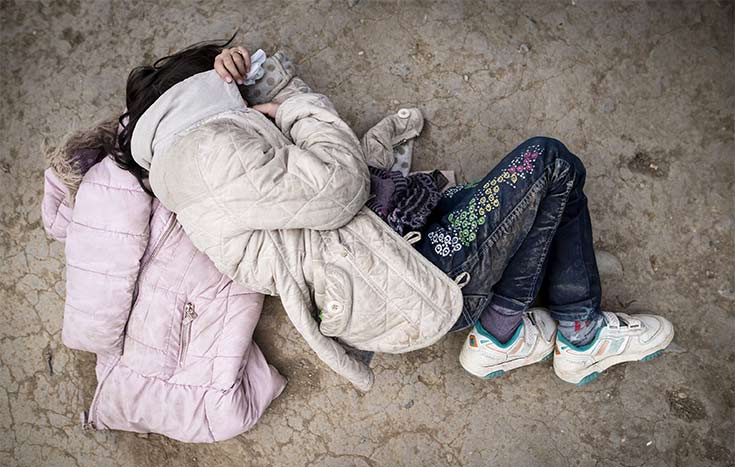Is enough being done to protect unaccompanied child refugees?
In an interview at the end of January, Europol brought attention to another very tragic aspect of the refugee crisis in Europe crisis, namely the disappearance of almost 10,000 unaccompanied children over the past two years after their arrival in Europe, writes Lina Kolesnikova. Brian Donald of Europol said that pan-European gangs are targeting minors for sexual abuse and slavery.

A young refugee sleeps on the ground at the Greek/Macedonian border on March 3, 2016. It is thought that more than 10,000 children have disappeared since arriving in Europe amid fears that many of them are being exploited by criminal gangs (ddp USA/Rex/Shutterstock)
Five thousand have disappeared in Italy alone. In October, the authorities in Trelleborg in southern Sweden said about 1,000 unaccompanied refugee children and young adults who arrived in the town in the previous month had since gone missing. Confirming the overall estimate of missing minors, a Europol spokesman said a large proportion have also vanished after landing in Greece. Meanwhile, Greece is hugely criticised for failing to register and check arrivals. Save the Children says some 26,000 child migrants arrived in Europe last year without any family. It is unclear whether all of them were properly registered.
"It is not unreasonable to say that we are looking at 10,000 plus children. Not all of them will be criminally exploited; some might have been passed on to family members. We just do not know where they are, what they are doing or whom they are with,” said Donald, who confirmed Europol had received evidence some unaccompanied child refugees in Europe had been sexually exploited. Europol also believes that a strong link exists between organised gangs helping to smuggle refugees into the EU, and the human-trafficking gangs exploiting them for sex work and slavery.
Minors risk their lives via crossing the sea or other routes to come to Europe. One third of all migrants who die during the crossing are children.
Many unaccompanied children are teenagers or young adults, who falsify their age. Families push young people to go to Europe alone for different reasons, one being that young people will get all the necessary permissions to stay more easily, and may reunite with their family afterwards.
They may get caught up in prostitution, drug trafficking or other illegal activities. Here, we are talking with organised criminal structures that force minors into slavery.
According to the UK’s Home Office, there is no single technique to determine an applicant's age. Home Office figures state that in the year up to September, 65 per cent of applicants who underwent an age assessment had a date of birth suggesting they were over 18.
It is necessary to have a targeted support to meet the specific needs of unaccompanied children or those who have been separated from their families or carers and who are therefore particularly vulnerable. These include: identifying children who are in need or at risk; providing safe places for children to stay; data management to help reunite children with their families; and services such as counselling and legal advice. Children who are not from war-zones should be sent back to their families – this sends a clear message to those attempting to use children for obtaining documents or for involving them in criminal activities.
Meanwhile, the general approach towards minors must be changed to prevent them from being exploited or caught up in serious criminal involvement.
In February 2016, Europol released a report entitled Migrant Smuggling in the EU, which says: “Europe has seen an unprecedented increase in the number of irregular migrants arriving in the European Union since 2014. The scale of these migratory flows reached previously unseen heights in 2015. This trend of exponentially increasing numbers of migrants arriving in the EU is set to continue in 2016.”
The report says that in 2015 more than one million migrants reached the EU, with a “profound impact” on Europe’s criminal landscape. Europol says that more than 90 per cent of migrants travelling to the EU used facilitation services which, in most cases, were offered and provided by criminal gangs. “A large number of criminal networks, as well as individual criminal entrepreneurs now generate substantial profits from migrant smuggling,” it said.
“In 2015 alone, criminal networks involved in migrant smuggling are estimated to have had a turnover of between EUR 3 -6 billion. This turnover is set to double or triple if the scale of the current migration crisis persists in the upcoming year,” according to the report.
In January 2016, 55 per cent of the irregular migrants arriving in the EU were women and minors, an increase of 34 per cent compared to 2015. A considerable proportion of the minors arriving in the EU are unaccompanied, travelling without a responsible adult. In 2015, 85,482 unaccompanied minors applied for asylum in the EU. This number is three times higher than in 2014. Fifty per cent of these unaccompanied minors were Afghan nationals and 13 per cent were of Syrian nationality.
“In many EU Member States, unaccompanied minors disappear from asylum or reception centres. In 2015, several networks involved both in migrant smuggling and labour exploitation were dismantled in the EU. The group of people vulnerable for labour or sexual exploitation is increasing, it is expected that these types of exploitation will increase in the upcoming years,” according to Europol.
Also in February, Europol launched the new European Migrant Smuggling Centre, the goal of which is to support EU Member States in dismantling criminal networks involved in organised migrant smuggling. The Centre will focus on geographical criminal hotspots, and will build a better capability across the European Union to fight people smuggling networks.
Lina Kolesnikova, 14/03/2016